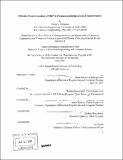Effective synchronization of MRP to production during a lean transformation
Author(s)
Richards, Philip L. (Philip Lloyd)
DownloadFull printable version (5.688Mb)
Alternative title
Effective synchronization of Material Resource Planning to production during a lean transformation
Other Contributors
Leaders for Manufacturing Program.
Advisor
Donald Rosenfield and James Kirtley.
Terms of use
Metadata
Show full item recordAbstract
Raytheon - Network Centric Systems (NCS) division develops and produces mission solutions for networking, command and control, battlespace awareness, and air traffic management. The facility in Largo, Florida, produces radios and their associated equipment for programs in the NCS division. The Largo facility uses traditional Material Resource Planning (MRP) systems to drive supply chain and production output. This push system runs directly against lean principles of flow and pull during Raytheon's continuous lean improvements. This tension makes the lean transition difficult for all aspects of the business. This thesis specifically examines the reduction in throughput variability that comes with lean controls and shows that the lean principles of flow, pull and pursuit of perfection help MRP be more accurate by providing the stability required for the MRP system. This is especially important during the transition between a classic MRP push system and the more efficient use of material planning available in a lean organization. Results of the alignment between operations and MRP include lower lead times, lower inventory and lower cost production. This thesis also explores the fundamental cultural, structural and political issues with implementing certain lean changes and the effects of these issues on variability of the system.
Description
Thesis (M.B.A.)--Massachusetts Institute of Technology, Sloan School of Management; and, (S.M.)--Massachusetts Institute of Technology, Dept. of Electrical Engineering and Computer Science; in conjunction with the Leaders for Manufacturing Program at MIT, 2007. Includes bibliographical references (p. 64-65).
Date issued
2007Department
Leaders for Manufacturing Program at MIT; Massachusetts Institute of Technology. Department of Electrical Engineering and Computer Science; Sloan School of ManagementPublisher
Massachusetts Institute of Technology
Keywords
Sloan School of Management., Electrical Engineering and Computer Science., Leaders for Manufacturing Program.